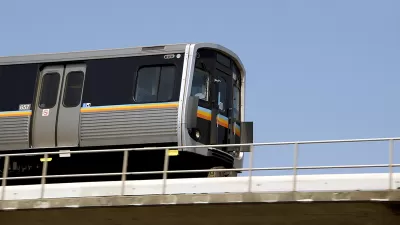Gwinnett County voters living have rejected proposals to pay taxes for the MARTA transit system before, so the latest proposal for a transit sales tax is going to great lengths to prove its local control bonafides.

David Pendered reports on the central role of the politics of local control to the transit sales tax on the ballot in November for voters in Gwinnett County, Georgia.
"MARTA will be involved only because state law requires it – and the role is restricted to heavy rail," writes Pendered. "MARTA is equally explicit in stating that Gwinnett County will exercise control over MARTA’s functions in Gwinnett through intergovernmental agreements. These agreements will help address the fact that Gwinnett County does not have a representative on MARTA’s board – because Gwinnett voters have rejected proposals to join MARTA."
According to Pendered, the transit sales tax proposal is designed to keep the revenue raised by the tax out of MARTA coffers, funding instead projects and programs favored by local officials.
The possibility of a regional approach to transit funding and planning has buried previous transit funding sales taxes proposed to Gwinnett County voters, despite the best rhetorical efforts of transit advocates in the Atlanta region.
In response to that history of reluctance to send tax money to a regional authority, "Gwinnett County’s official educational materials regarding the transit proposal – Your plan, Your vote, Your choice – has an entire section that’s titled, Local Control," explains Pendered.
The county has done more—a lot more in fact—to highlight the local control embedded in November's ballot proposal, as shown by Pendered in the source article.
FULL STORY: Gwinnett County transit vote: Local control is the watchword

Alabama: Trump Terminates Settlements for Black Communities Harmed By Raw Sewage
Trump deemed the landmark civil rights agreement “illegal DEI and environmental justice policy.”

Study: Maui’s Plan to Convert Vacation Rentals to Long-Term Housing Could Cause Nearly $1 Billion Economic Loss
The plan would reduce visitor accommodation by 25% resulting in 1,900 jobs lost.

Planetizen Federal Action Tracker
A weekly monitor of how Trump’s orders and actions are impacting planners and planning in America.

Wind Energy on the Rise Despite Federal Policy Reversal
The Trump administration is revoking federal support for renewable energy, but demand for new projects continues unabated.

Passengers Flock to Caltrain After Electrification
The new electric trains are running faster and more reliably, leading to strong ridership growth on the Bay Area rail system.

Texas Churches Rally Behind ‘Yes in God’s Back Yard’ Legislation
Religious leaders want the state to reduce zoning regulations to streamline leasing church-owned land to housing developers.
Urban Design for Planners 1: Software Tools
This six-course series explores essential urban design concepts using open source software and equips planners with the tools they need to participate fully in the urban design process.
Planning for Universal Design
Learn the tools for implementing Universal Design in planning regulations.
Caltrans
Smith Gee Studio
Institute for Housing and Urban Development Studies (IHS)
City of Grandview
Harvard GSD Executive Education
Toledo-Lucas County Plan Commissions
Salt Lake City
NYU Wagner Graduate School of Public Service




























